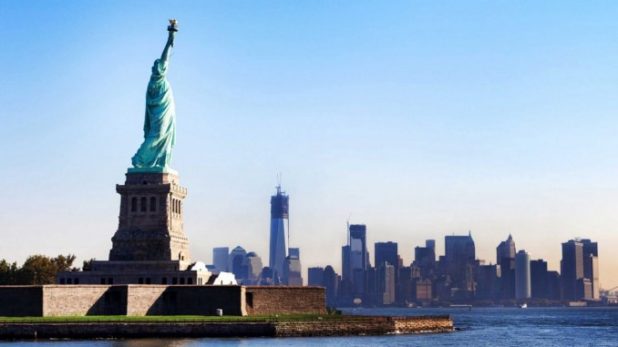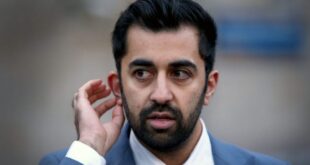Hunter Wallace
Occidental Dissent
March 31, 2017
Don’t take my word for it.
FEE.org spells out the monstrous implications of libertarian principles in their own words:
“Liberty has nothing to do with national interests. It is about the individual. It concerns the liberty to live your own life, to pursue your own livelihood, and to come and go as you please to anywhere that’s open to you or anywhere you’re invited to go.
The implications for immigration policy are obvious: Everyone–not just Americans, not just “citizens,” not just people with government permission slips, but everyone–has rights. They have the right to own or lease property, to take jobs, to make their own living, wherever they want, and to peacefully come and go whenever, wherever, and however they please as long as they don’t infringe on any other individual’s equal liberty. That means nothing short of free immigration, open borders, and immediate and unconditional amnesty for all currently undocumented immigrants. …
Nations are toxic hellholes of false identity and purveyors of monstrous political violence. … For anyone committed to individual liberty, a nations’ “interests” deserve no notice at all except to trample them underfoot.”
In other words, the nation is incompatible with libertarianism. The state, of course, is the great enemy of libertarianism. I suppose you could add cultures, ethnic groups, religious traditions and families. According to this absurd worldview, all “collectives” are the enemy of the “individual.” The only identities in life that are meaningful under libertarian dogma are “the individual” and “the consumer.”
Why is that the case? The answer is because our Jewish gurus have come up with abstract theories that have told us so! Certainly, this bizarre worldview isn’t based on anything resembling empirical observation. In the real world, there are any number of identities which human beings find meaningful: religious identity, cultural identity, family identity, national identity, ethnic identity, racial identity, class identity, these days some people even prize their sexual and gender identity.
I’ve been assigned the identities “the individual” and “the consumer” by libertarian theorists. I was never consulted about my opinion of their pet abstractions. Instead, I was cast in the role that they want me to play in their narrative. In reality, I don’t find much value in being a “consumer.” I find that much less meaningful than the racial identity, ethnic identity, cultural identity and religious identity which are the building blocks that make up my national identity. As an individual, I have a range of loyalties that are central to my sense of identity, which is more than my personal identity.
I didn’t even get to choose my personal identity. I was born into a family without my consent. I was given a name by my parents. I didn’t get to choose my parents or ancestors. I didn’t get to choose my race, sex, culture or where I was born. On the contrary, I was passively immersed in a language as an infant and toddler, which gave me the concepts that continue to structure how I think about the world. I passively absorbed the culture that I was exposed to as a child and as an adolescent.
My life is already a web of rich meaningful roles and identities which have been bequeathed to me through my organic tradition: Husband. Father. Son. (Family) Protestant Christian. (Religion) British. (Ethnicity) Southerner. (Culture) Alabamian. (State) White man (Race and Sex). Why would I throw away all of that in order to try to find a meaningful identity in the beef at Taco Bell, in the McDonald’s McDouble or in a six-pack of Budweiser on sale at a multicultural Wal-Mart?
As a worldview, it sounds like a prole version of Patrick Bateman in American Psycho whose vacuous, materialistic identity is based on consumption of high-end brands:
“Some kind of existential chasm opens before me while I’m browsing in Bloomingdale’s and causes me to first locate a phone and check my messages, then, near tears, after taking three Halcion (since my body has mutated and adapted to the drug it no longer causes sleep-it just seems to ward off total madness), I head toward the Clinique counter where with my platinum American Express card I buy six tubes of shaving cream while flirting nervously with the girls who work there and I decide this emptiness has, at least in part, some connection with the way I treated Evelyn at Barcadia the other night, though there is always the possibility it could just as easily have something to do with the tracking device on my VCR, and while I make a mental note to put in an appearance at Evelyn’s Christmas’ party-I’m even tempted to ask one of the Clinique girls to escort me-I also remind myself to look through my VCR handbook and deal with the tracking device problem. …”
I think I will pass on being a “liberated” individual. I don’t need drugs, frivolous sexual relationships or consumerism to fill a great void at the center of my life. The only identity that libertarianism has to offer me is an ideological one vastly inferior to the one I have now.
As for the liberal tradition, Jeffrey Tucker can’t even honestly lay claim to that:
“Trump is obviously not a student of history or political philosophy, but he does embody a strain of thinking with a history that traces back in time. I discussed this in some detail here, here, and here, among many other places. The tradition of thought he inhabits stands in radical opposition to the liberal tradition. It always has. We just remain rather ignorant of this fact because the fascist tradition of thought has been dormant for many decades, and so is strangely unfamiliar to this generation of political observers.
So let us be clear: this manner of thinking that celebrates the nation-state, believes in great collectives on the move, panics about the demographic genocide of a race, rails against the “other” invading our shores, puts all hope in a powerful executive, and otherwise believes not in freedom but rather in compliance, loyalty, and hero worship – this manner of thinking has always and everywhere included liberals (or libertarians) as part of the enemy to be destroyed. …”
Thomas Jefferson was a well-known Anglo-Saxonist. He was a racialist. The Founding Fathers didn’t create a system resembling anything like what Jeffrey Tucker is advocating. They had very different ideas about a national bank, internal improvements, free-trade, race, the family, dual sovereignty, etc.
Jeffrey Tucker’s version of “liberty” was plainly rejected in both Britain and the United States. Neither Britain or America ever dissolved itself into an anarchic sea of individuals. These were relatively individualistic societies which valued “liberty,” but not in the extreme sense of libertarian discourse which condemns “collectivism” and “the state” and “war” per se.
As always, the historicist in me consults history to find the meaning and evolution of ideas:
In Exclusionary Empire: English Liberty Overseas, 1600-1900, we find a clue as to how the discourse of “liberty” has evolved over time:
“It was not the specificity of the meaning of liberty but its plural and plastic meanings that allowed ideas and applications of liberty to become abstracted from their commercial, political, and religious contexts, so that Britons throughout the world could espouse loyalty to the empire based on the shared sense that the expansion of liberty was central to the empire’s meaning and distinguished it from other empires, both European and Asian. Indeed, the abstracting, and for some the ostensible naturalizing, of liberty contributed to the emergence of another iteration in the mid-eighteenth century, one employed against the institution of slavery so that every person’s natural right to a free body became a fifth powerful meaning attached to liberty.”
I find this very interesting.
According to Jeffrey Tucker and FEE.org, this fifth sense of liberty is the only meaning of “liberty.” It is natural liberty in that the argument for it is based outside of society. It is abstract and universal in that it applies to all human beings. It is not English liberty in the sense of being a product of the English tradition or British constitution and something that inhered in the bodies of all English subjects.
Eventually, this strand of “liberty” became cancerous and destructive of all social bonds. It became abstract and lost its reference point. This is not the “liberty” that Jefferson was talking about in the Declaration of Independence when he damned King George III for being “deaf to the voice of justice and of consanguinity.” The colonists were making an argument over Parliament’s sovereignty over the American colonies, not against the concept of sovereignty itself which republicans invest in the people.
These anarchists are discrediting the concept of a “free society.” By associating “liberty” with licentiousness and extreme ideas like the dissolution of borders, they are bringing the tradition of liberty into disrepute. As I read more about the history of American liberty, I have began to realize that these ideas are a foreign import.
 Daily Stormer The Most Censored Publication in History
Daily Stormer The Most Censored Publication in History




